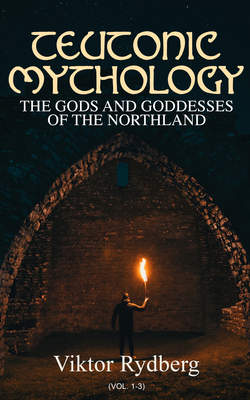Читать книгу Teutonic Mythology: The Gods and Goddesses of the Northland (Vol. 1-3) - Viktor Rydberg - Страница 32
На сайте Литреса книга снята с продажи.
ОглавлениеTHOR, THE THUNDER GOD. (From the painting by M. E. Winge.) Thor was reputed to be the son of Odin, surnamed the All-father, and Jorth, the earth. He was the source of wisdom, patron of culture and of heroes, friend of mankind and slayer of giants. He always carried a heavy hammer, called The Crusher, with which he fought, assisted by thunder and lightning. From Thor is derived the middle English words Thursday (Thorsday) and Thunder.
But Tacitus' contribution to the Teutonic migration saga is not limited to this. In regard to the origin of a city then already ancient and situated on the Rhine, Asciburgium (Germ., 3), his reporter had heard that it was founded by an ancient hero who had come with his ships from the German Ocean, and had sailed up the Rhine a great distance beyond the Delta, and had then disembarked and laid the foundations of Asciburgium. His reporter had also heard such stories about this ancient Teutonic hero that persons acquainted with the Greek-Roman traditions (the Romans or the Gallic neighbours of Asciburgium) had formed the opinion that the hero in question could be none else than the Greek Ulysses, who, in his extensive wanderings, had drifted into the German Ocean and thence sailed up the Rhine. In weighing this account of Tacitus we must put aside the Roman-Gallic conjecture concerning Ulysses' visit to the Rhine, and confine our attention to the fact on which this conjecture is based. The fact is that around Asciburgium a tradition was current concerning an ancient hero who was said to have come across the northern ocean with a host of immigrants and founded the above-named city on the Rhine, and that the songs or traditions in regard to this ancient hero were of such a character that they who knew the adventures of Ulysses thought they had good reason for regarding him as identical with the latter. Now, the fact is that the Teutonic mythology has a hero who to quote the words of an ancient Teutonic document, "was the greatest of all travellers," and who on his journeys met with adventures which in some respects remind us of Ulysses'. Both descended to Hades; both travelled far and wide to find their beloved. Of this mythic hero and his adventures see Nos. 96–107, and No. 107 about Asciburgium in particular.
It lies outside the limits of the present work to investigate whether these traditions contain any historical facts. There is need of caution in this respect, since facts of history are, as a rule, short-lived among a people that do not keep written annals. The historical songs and traditions of the past which the Scandinavians recorded in the twelfth century do not go further back in time than to the middle of the ninth century, and the oldest were already mixed with stories of the imagination. The Hellenic historical records from a pre-literary time were no older; nor were those of the Romans. The question how far historically important emigrations from the Scandinavian peninsula and Denmark to Germany have taken place should in my opinion be considered entirely independent of the old migration traditions if it is to be based on a solid foundation. If it can be answered in the affirmative, then those immigrations must have been partial returns of an Aryan race which, prior to all records, have spread from the South to the Scandinavian countries. But the migration traditions themselves clearly have their firmest root in myths, and not in historical memories; and at all events are so closely united with the myths, and have been so transformed by song and fancy, that they have become useless for historical purposes. The fact that the sagas preserved to our time make nearly all the most important and most numerous Teutonic tribes which played a part in the destiny of Southern Europe during the Empire emigrants from Scandinavia is calculated to awaken suspicion.
The wide diffusion this belief has had among the Teutons is sufficiently explained by their common mythology—particularly by the myth concerning the earliest age of man or of the Teutonic race. As this work of mine advances, I shall find opportunity of presenting the results of my investigations in regard to this myth. The fragments of it must, so to speak, be exhumed from various mounds, and the proofs that these fragments belong together, and once formed a unit, can only be presented as the investigation progresses. In the division "The Myth concerning the Earliest Period and the Emigrations from the North," I give the preparatory explanation and the general résumé (Nos. 20–43). For the points which cannot there be demonstrated without too long digressions the proofs will be presented in the division "The Myth concerning the Race of Ivalde" (Nos. 96–123).
